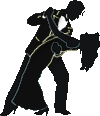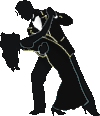
Ballroom Dance
J M (Mike) Nelson
Email:jmnelson@cloudnet.com
Phone: 612-810-0157

| jmnelson.com | Dance Home Page | Dance Curriculum | Dance Articles |
 |
Ballroom DanceJ M (Mike) Nelson |
 |
Selecting A Dance TeacherSome dancers teach, and some teachers dance, but don't assume that a ballroom dance instructor can do either. Here are a few questions you might ask a prospective teacher. What are your teaching credentials? What learning theories guide your instructional design? How do you structure your curriculum? How do you use research? How often do you attend public dances? Which dance styles do you dance in public? Where do your students go to dance? How many critical items, whether cognitive or psychomotor, do you introduce in each lesson, and do you have a list of them? If you've made it this far, you are likely interested in getting the most for your effort, so this is the most important question for any teacher. If they cannot answer that question definitively, then they cannot say for sure whether or not the average person can comprehend and retain the material in their lessons. If they cannot give you a list of the specific requisites for mastery of each lesson, then they clearly have given little thought as to what they are about. For an overview of how this relates to dance lessons, see Why Our Ballroom Dance Classes are Better. At least why I think so. For a summary of some related learning theories, see Learning Theories For an outline of the task analysis, see Dance Instruction Assessment For insight into how facts about short term memory influenced the design of Ballroom Basics, see Applied Theory For more about the relationship between the traditional and the Nelson Studio approach, see A Side By Side Comparison For more about how this approach evolved, see: Teaching Ballroom Dance: A Rationale For an Alternative Approach
|
| jmnelson.com | Dance Home Page | Dance Curriculum | Dance Articles |
Copyright (c) 2006, J. M. Nelson. All rights reserved. Reproduction of contents prohibited without prior permission from the author.